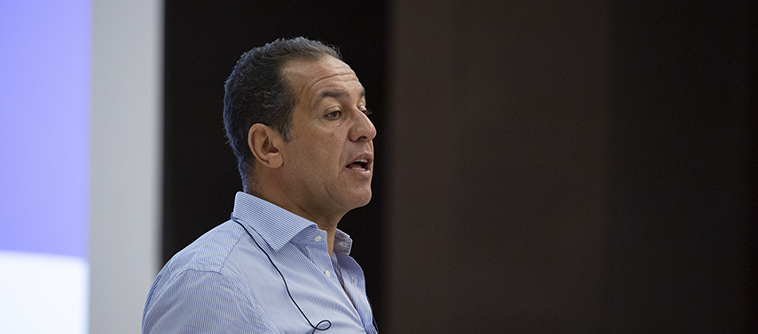“The more senior you become in your career, the less true feedback you will receive,” said Sameh Abadir, Professor of Leadership and Negotiation at IMD.
Speaking in an interactive session on Leadership, Crisis and Stress Management at our signature program, Orchestrating Winning Performance in Dubai, Professor Abadir added that this means as your professional life progresses, the lonelier you will become.
This can make dealing with crisis situations – and even knowing that you are in one in the first place – even harder.
Lesson number one of being in a crisis and how to get out of it, is to acknowledge it, he said. But how do you know you are even in a crisis? It’s difficult, Abadir said, because often only the people around us know. “We are who we are, and unless the people around us tell us that we’re facing a crisis, we will keep doing business as usual and no one will know.”
Emotion high, logic off
Abadir, who served in the Egyptian Special Forces between 1985 and 1988, said he had learned five lessons on what typically happens in a crisis that have been partly informed by his time in the military.
Number one, he said, is that “we do what we know, and people act with their reflexes. Emotion is turned up high, and logic is turned off. It’s like a heightened discussion with your family, when you lose your temper, are you thinking logically before you speak? Of course not.”
Secondly, under severe stress it is impossible to predict a person’s behavior. “Some people have the ability to absorb it, some don’t,” Abadir said. “You need to surround yourself with a group of people you can trust, and it also really helps if you are physically fit.”
Third, we have to save people’s energy for what can be an extremely stressful and tiring experience. “If you can let people walk, you should not ask them to run,” he said. “If they can sit, don’t ask them to stand.”
Fourth, “make sure people working for you share bad news with you as soon as possible. You are more experienced so you can step back and look at the broader perspective, they can’t,” Abadir added.
Fifth, and more important of all, Abadir says, “if you are ambushed, professionally or privately, the only way to survive is to counter attack.”
Allies
You have three allies to help you deal with crisis situations, Abadir said. “The first is time. Can I buy time to deal with this crisis? Usually the answer to this is no. Second, you have distance. Can I step back and go to my base? This is where I can get help and feel more comfortable. Lastly – your own moderation.”
It’s also important to not how too much empathy, Abadir added. “Empathy is exhausting. It’s also a zero-sum game and – you give it to some people, and you may be taking it away from someone else. Most importantly, from a business perspective, too much empathy can erode business ethics.”
After a crisis, always stick to the facts, said Abadir. “As we exit a crisis, we stick to the facts though everyone will have an opinion. And avoid embellishment.”
Saving face
When trying to solve or manage a crisis, Professor Abadir also stressed how important it is to never allow someone to lose face, citing the resolution of the 1962 Cuban Missile Crisis is a powerful example.
When the crisis ended after 11 days, wrote Robert F Kennedy (who was at the time United States Attorney General), what guided his brother President John F Kennedy was an effort not to disgrace Khrushchev and not to humiliate the Soviet Union.
“You can be as powerful as a pharaoh or king but never allow the other side to lose face,” Abadir said. If you do, you are putting them in the position when they have to decide whether to be smart, or to maintain their dignity.
Even when the crisis has seemingly come to an end, you must stay alert, he added. If you lose your job, for example, it’s important to stay alert to any potential knock-on effects, such as disruption to your personal life. “Beware the post-crisis crisis,” he said.
Finally, effective teamwork where everyone understands their role is essential. “When a crisis occurs, multiple fronts appear at the same time,” Abadir said. “No one can handle all of them. If you have a team, they should all be in charge of something. We are all gifted at different things and everyone should be doing what they do best.”



